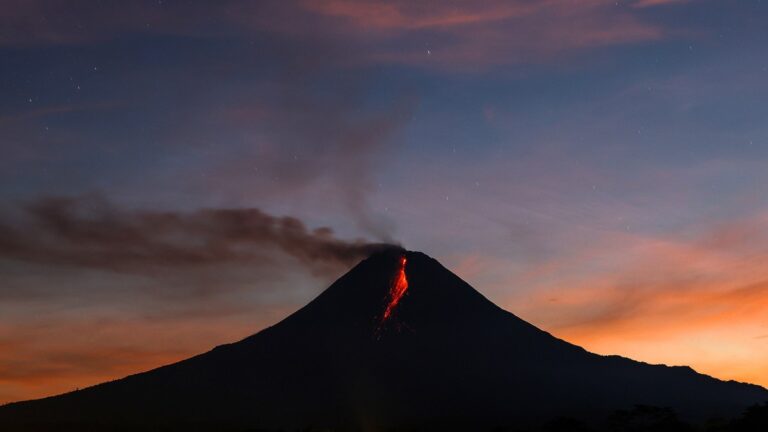Mount Marapi, a volcano in western Sumatra, has erupted for the second time in just over a month. There were two eruptions recorded by Indonesia’s geological agency on January 14. Residents living within 4.5 km (2.8 miles) have been urged to evacuate but so far no injuries have been reported.
The volcano is the most active in Indonesia and its last major eruption was in 1979, when 60 people died. During its previous eruption on December 3, 2023, over 70 hikers were on the mountain. Of these, 50 were evacuated immediately, but 23 were killed. On December 12 the Foreign Office updated its travel advice, stating that all travel within 3km (1.9 miles) of the crater should be avoided.
Main photo: Mount Marapi in western Sumatra (Getty Images)

Where is Mount Marapi and when did it erupt?
Mount Marapi is on the island of Sumatra, the closest Indonesian island to mainland Asia and the third-largest in the country. The volcano has the towns of Bukittinggi, Padang Panjang and Batusangkar at its base and is part of the Pacific’s “Ring of Fire” — home to 127 active volcanoes — where the meeting of continental plates can cause large amounts of volcanic and seismic activity.
In terms of nearby tourist destinations, the closest major city is Singapore, which is around 700km from Mount Marapi, while Bali is around 2,575km away. So far there has been no impact reported in either destination following the eruption.
The volcano erupted twice on January 14, 2024, according to Indonesia’s geological agency. No injuries have been reported but residents living within 4.5 km (2.8 miles) have been urged to evacuate. Lava flows in rivers and valleys is a strong possibility.
It also erupted on December 3, 2023. At the time, there were over 70 hikers on the mountain and 23 were killed while 50 were successfully evacuated.

Indonesia’s Mount Marapi previously erupted on Sunday, December 3, 2023 (Getty Images)
What’s the latest government advice about travelling to Indonesia?
The UK Foreign Office last updated its advice for Indonesia on December 12. It advises against all travel to within 3km of the crater. In addition, it also currently advises against all travel to two other volcano mountains — Mount Sinabung in the Karo Regency and Mount Semeru area in the Lumajang Regency — but they’re not typically areas that tourists would visit.

Evacuation efforts when the mountain erupted last year (Alamy)
Is it safe to travel to Indonesia right now?
On the whole, yes, although the usual caveats apply. Aside from the two regions mentioned above, the rest of Indonesia is deemed safe to visit, although there are warnings in place.
The Foreign Office advises that “terrorists are very likely to try to carry out attacks in Indonesia” and that the “threat of Islamist extremism remains high”. Potential targets for attacks could include large, crowded spaces such as beach resorts, restaurants, airports and tourist attractions, and there’s a higher risk during holiday periods such as Christmas and Chinese New Year as well as during election periods.

The Foreign Office advises against all travel to within 3km of the crater (Alamy)
Which islands are unaffected?
Bali, the main tourist island in Indonesia and visited by millions of visitors a year, is unaffected as it’s about 2,575km away — likewise for its neighbour Lombok. The capital Jakarta, on the island of Java, is also unaffected and flights are taking off and landing as normal.
• Best hotels in Bali
• Best luxury villas in Bali

Travellers in Ubud (Getty Images)
Is Indonesia safe for female travellers?
On the whole, yes. Women should take normal precautions in busy areas such as Bali and Jakarta, and keep their wits about them at night by using licensed taxis and avoiding less crowded places. Indonesia — with the exception of Hindu Bali — is a majority Muslim nation, so women should dress appropriately when visiting religious sites.

Diamond Beach in Nusa Penida, an island near Bali (Getty Images)
Is Indonesia safe for LGBTQ travellers?
Homosexuality is not punishable by law across most of Indonesia, but it is considered a taboo topic. However, it is illegal in the northern province of Aceh, which is governed by sharia law, and people have been publicly flogged for breaking the law. Visitors to Indonesia should note that there is a stigma around homosexuality and that the country does not accept same-sex marriage. There are no laws protecting the LGBTQ community against discrimination or hate crimes.
• The safest countries for LGBTQ travellers
• Where is hot in February? 14 sunny destinations
Additional reporting by Qin Xie
Sign up for the Times Travel Newsletter here.

